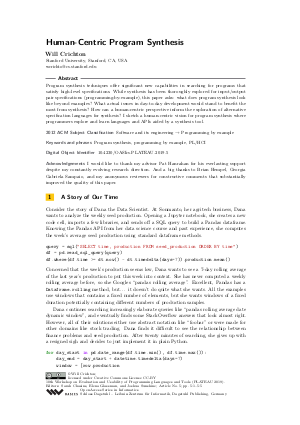@InProceedings{crichton:OASIcs.PLATEAU.2019.5,
author = {Crichton, Will},
title = {{Human-Centric Program Synthesis}},
booktitle = {10th Workshop on Evaluation and Usability of Programming Languages and Tools (PLATEAU 2019)},
pages = {5:1--5:5},
series = {Open Access Series in Informatics (OASIcs)},
ISBN = {978-3-95977-135-1},
ISSN = {2190-6807},
year = {2020},
volume = {76},
editor = {Chasins, Sarah and Glassman, Elena L. and Sunshine, Joshua},
publisher = {Schloss Dagstuhl -- Leibniz-Zentrum f{\"u}r Informatik},
address = {Dagstuhl, Germany},
URL = {https://drops.dagstuhl.de/entities/document/10.4230/OASIcs.PLATEAU.2019.5},
URN = {urn:nbn:de:0030-drops-119590},
doi = {10.4230/OASIcs.PLATEAU.2019.5},
annote = {Keywords: Program synthesis, programming by example, PL/HCI}
}

 Creative Commons Attribution 3.0 Unported license
Creative Commons Attribution 3.0 Unported license












